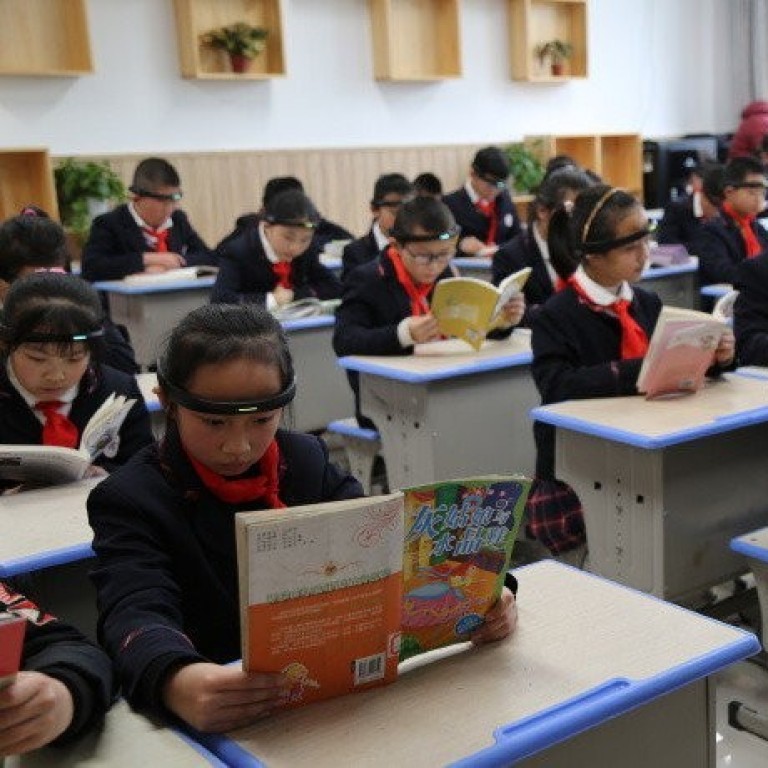
BrainCo CEO says his ‘mind-reading’ tech is here to improve concentration, not surveillance
- BrainCo has developed a technology that detects and translates human brain signals via the use of advanced sensors and AI algorithms
- Social media storm erupted after pictures emerged showing kids wearing Focus headbands in school classroom
As Harvard-educated engineer Han Bicheng worked day and night with his team in Boston on a new invention aimed at benefiting the entire human race, on the other side of the Pacific his “mind-reading” product became mired in an online controversy about how China’s adoption of groundbreaking technologies may spur the creation of a surveillance state.
Founded in Somerville, Massachusetts, Han’s four-year-old start-up BrainCo is turning something from the realms of science fiction into a working reality – namely a brain-machine interface device.
By detecting and translating human brain signals via the use of advanced sensors and complicated machine learning algorithms, the company has developed a technology that not only improves people’s cognitive skills but also allows them to control the movement of a robot at a distance purely through the power of their minds.
As BrainCo says in its marketing materials, it wants to “ultimately help humans reach their full potential”.
However, in the more down-to-earth world of social media, a controversy erupted after a post in China showed pictures of schoolchildren wearing BrainCo Focus head bands transmitting signals to an external device, which could then be used by teachers to monitor how focused the kids were during class.
This prompted an instant outcry over heavy-handedness and authoritarian prying by China’s netizens at a time when AI-enabled facial recognition technologies are being rolled out across the country to assist with border control, airport security and to catch criminals on the run.

“What did these children do wrong to deserve this life of constant monitoring?” said one Weibo post on the controversy earlier this month. “It boggles my mind that we cannot put ankle bracelets on paedophiles but it is astonishingly easy to put headbands on these powerless kids.”
For 32-year-old Han though, the idea that his brainwave technology could be used to promote a surveillance state is mistaken and absurd.
“The popularity of any new technology comes with controversy,” said Han in a recent interview at his company’s headquarters in Boston. “Why would any school pay for such devices just for the sake of monitoring students? A teacher can do that with a simple glance of the classroom.”
“Any product has to answer to market demand and create value,” he added. “There is no value in using this to simply monitor students. The true value is it can effectively improve student’s scores through training them to focus better.”
Han says the photos shown in the viral media posts are actually from a trial project in a Chinese school that was aimed at testing the effectiveness of BrainCo’s Focus headbands to enhance concentration. Thousands of students around the world took part in the trials, says Han, which were aimed at improving the capacity to focus, and not surveillance.
In face, one student in China saw his test score jump 98 points [in a standard test where a full score is 150 points] after several months of practice.
To be sure, Han’s remarks will not silence every social media criticism and history is littered with examples of where new technology is often put to use in areas not originally intended by its inventor.
China’s netizens have also been quick to question other applications of new technology by authorities, such as the smart uniforms equipped with tracking chips some Chinese schools in Guizhou province have been using to monitor the whereabouts of students and prevent them from leaving school without permission.
BrainCo’s technology is different though and the emphasis is very much on improving educational results.
By using so-called electroencephalography (EEG) sensors to detect brain signals and deploying an AI algorithm to translate the signals into focus levels in real time, BrainCo’s headband provides insights into the engagement levels of students, allowing teachers to adjust their teaching style based on the feedback.
Data gathered from the headbands is also used to design focus-training games, aimed at helping students prime their brains for optimal performance before starting class.
With a PhD on multiple sensory integration research from the Center of Brain Science at Harvard University, Han says the inspiration for applying his team’s work to education was his personal experience of seeing so many schoolchildren suffer from long study hours but failing to achieve good grades because they can’t focus properly.
“Whether or not a child can have good scores at school comes down to three elements; time, educational content and efficiency. The difference between the top and bottom [person] in a class is really about their ability to focus when they study,” he said.
For example, Han says it would be impossible for him to simply wake up tomorrow and run 5km because he has never run such a long distance before.
“But if there was a trainer pushing me every day towards running 5km within a month, then I could easily go jogging without suffering too much. The same method can be applied to training the brain to stay focused,” he said.
In China, where tiger parents can invest heavily in their children’s education to help them stay ahead amid fierce competition, focus training is helping BrainCo to win orders.
Despite the controversy and after only bringing its first commercial products to market earlier this year, BrainCo has already achieved positive cash flow. On JD.com, China’s second-biggest e-commerce site, BrainCo headbands are priced between 3,499 yuan (US$519) and 4,299 yuan each by a distributor and some user comments describe the device as “very useful”.
Without revealing detailed sales figures, Han estimates that the company, which is building offices in Shenzhen and Hangzhou to expand further, can break even later this year.
And helping children to achieve good scores is not the only thing on BrainCo’s plate. In the company’s bright and spacious offices in Boston, dozens of scientists and engineers from Harvard and MIT are working on different projects based on brain machine interface technology.
On a table where there are several robotic hands, the company is developing what it describes as the world’s most affordable AI-powered prosthetic hand. Elsewhere a lab, which looks like your typical, cosy bedroom, is being used to test potential products to improve people’s sleep.
Another lab, decorated like a children’s playground, is being used to explore the technology’s ability to help children cope with autism.
The company is also working on leveraging the technology to address senile dementia. In the field of sports, the US weightlifting team has recently partnered with BrainCo to help athletes train their minds to achieve high focus levels.
“I wouldn’t be surprised that in the field of brain machine interface technology, there will be a company that is as big as Facebook is today in terms of revenue and the number of users. I sincerely hope that company can be BrainCo,” said Han.

